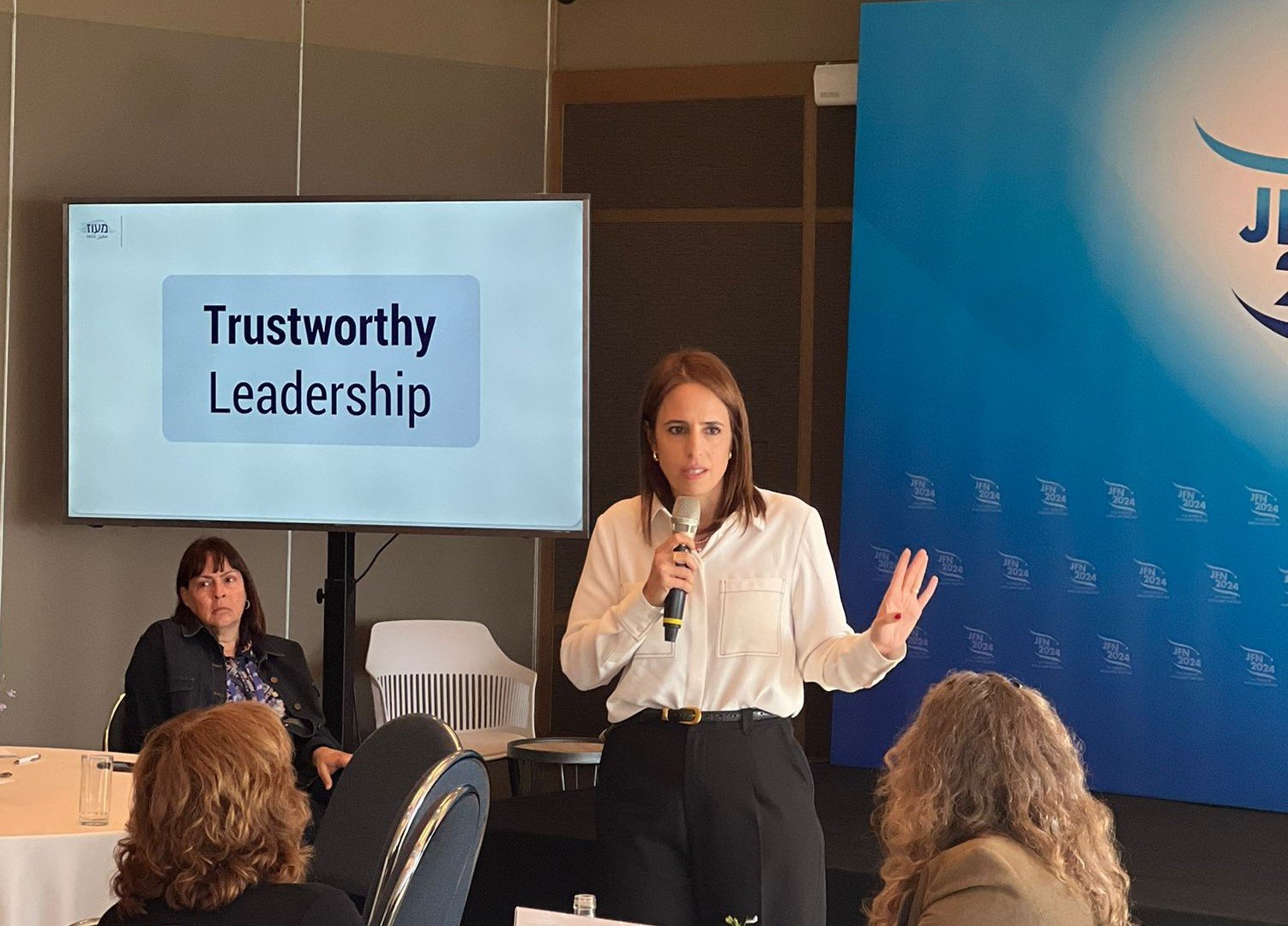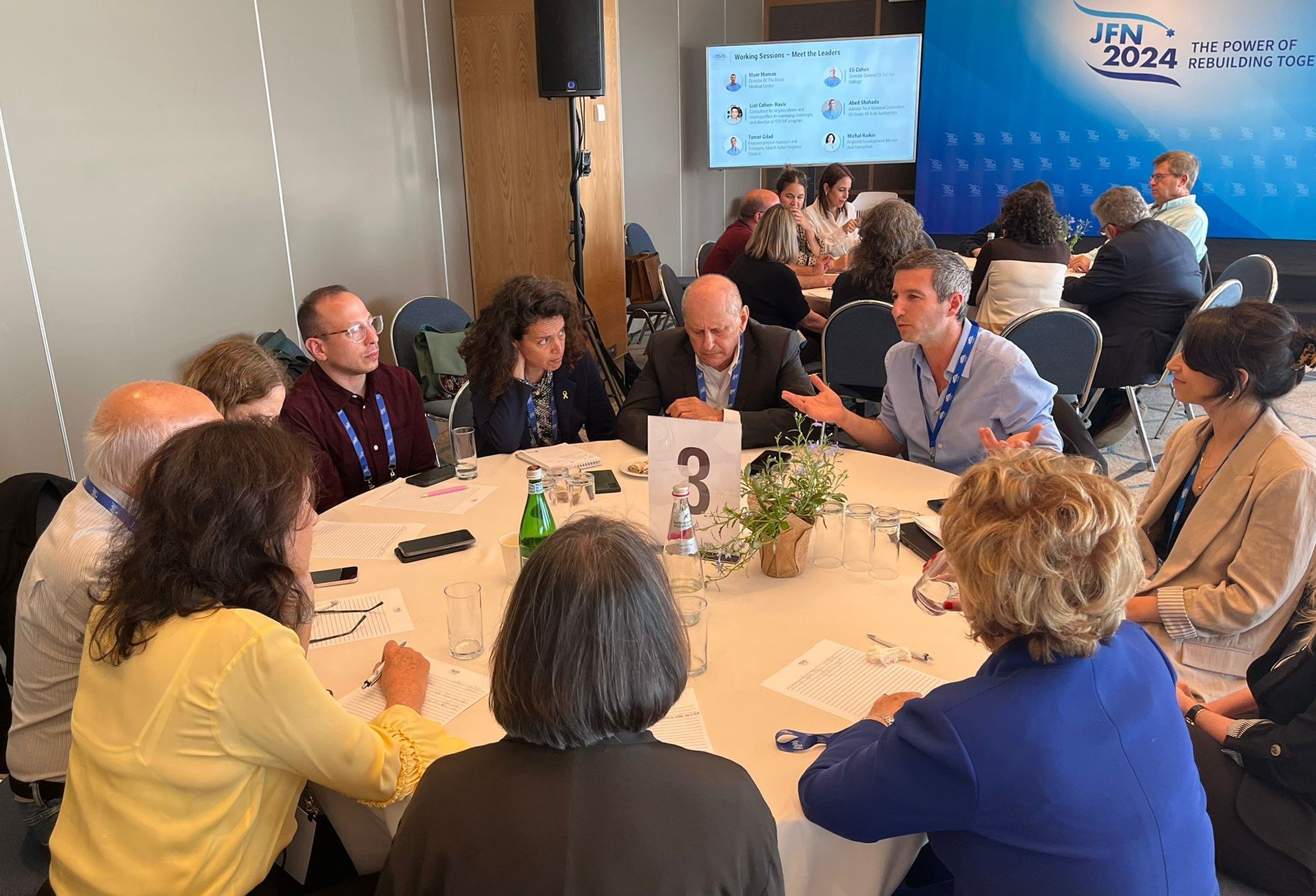Idana Goldberg
This weekend, Jewish people around the world will celebrate Purim, a holiday that is steeped in uncertainty and reluctant heroes. To me, one of the most resonant passages in the Hebrew Bible comes from the Book of Esther, traditionally read on Purim. As the new Queen wavers over how to combat the genocidal actions of Haman, her Uncle Mordechai chides her, “Umi yodea' im le'et kazot higgaat la’malchut.” “Who knows if you have become royalty for a time such as this?” Esther then takes action, putting into motion the plan that will ultimately save the Jews.
The idea that we may not understand why we’re in the circumstances we face, but that somehow our experiences up to this point ready us to act in service of a bigger mission, is both comforting and guiding. I often return to this notion when I ponder the sometimes challenging, sometimes unexplainable, twists and turns of my life – those “le’et kazot” (for this time) moments.
At the Jewish Funders Network (JFN) conference this week in Tel Aviv, philanthropists who care about Israel’s precarious future confronted our own “le’et kazot” moment. Facing circumstances that have rocked us and our work to the core, we are poised to draw upon our decades of giving to act now in service of an Israel that emerges safer, stronger, and more resilient than it was before October 7th.
There is no denying that this degree of uncertainty and risk makes it exceedingly hard to know how best to move forward. But the funding community must take stock of what has brought us to this moment and look to the strategies and partnerships that have proven impact to guide us in serving our bigger mission.
We see this in the donors and foundations who have channeled more than $1 billion to support humanitarian aid and wartime response efforts. Much of that giving has focused on Israel’s South, where Hamas terrorists reduced whole communities to rubble and weakened core infrastructure. Through focused effort, government ministry plans for rebuilding and repopulating Gaza envelope communities are being put in motion.
While rehabilitating the South remains a pressing priority, there’s been too little focus on the crisis unfolding in the North. Before October 7th, the Galilee grappled with wide socioeconomic disparity gaps, too few good jobs that could attract new residents and entice existing talent to stay, and weak local governance. Now, as the Israel-Hamas war wages on, its every economic, social, and security challenge has been exacerbated.
MAOZ CEO Shimrit Bainhoven shares how MAOZ North’s network of leaders is tackling challenges facing the North during the Israel-Hamas war and beyond.
It’s become more a question of “when” than “if” a second front will erupt along the northern Lebanese border to eliminate the security threat posed by Hezbollah. Intensified border strikes led the government to evacuate more than 80,000 Israelis who have no timeline for returning home. With their ability to earn a living and plan their futures disrupted, 40% of border community evacuees say they will not go back if prospects for security don’t fundamentally improve.
If we don’t take bold corrective actions, we can expect untold numbers of residents to relocate to the center, communities to be abandoned, investment to flow elsewhere, shortages in essential service providers to result in a less healthy and livable society, and industrial and agricultural production to plummet[1]. In effect, the North’s steep challenges have become existential in five devastating months.
If we return, however, to Purim’s origin story, and the idea that our past prepares us for the future – and compels us to action – we see that decades of investments in strengthening the North can illuminate the paths philanthropists can take now to address this crisis and solidify the region’s prospects for growth and prosperity.
The Russell Berrie Foundation, together with other committed funders, has supported efforts for more than 15 years to establish economic development clusters, strengthen governance effectiveness in local authorities, address health disparities, and improve people’s quality of life throughout the Galilee.
For instance, over the past five years, we’ve worked with Maoz to replicate its national network of change leaders through a Galilee-focused initiative called Maoz North. Having grown its reach and results through multi-year grants, Maoz North was poised to spring into action after October 7 to link and coordinate the problem-solving capacities of experienced leaders who can tackle the specific challenges defining the region’s future. Their efforts will be crucial in helping local governments, businesses, and civil society organizations carry out policies and programs that can help restabilize and grow the periphery.
Our aim is to revolutionize the region’s future in ways that make the North the standard-bearer for robust economies, a high quality of life, and thriving, secure communities.
The Foundation also has invested in strategies that help northern Arab communities become stronger, healthier, and more effective. Prior to October 7th, the Russell Berrie Galilee Diabetes SPHERE – an ambitious initiative housed within Bar-Ilan University that advances research, prevention, and treatment efforts to reduce disparities in diabetes rates across the Galilee – was working with 17 Arab municipalities to map health ecosystems, train health leaders, and outline the business case for addressing health as a core action area. After the attacks, SPHERE helped communities rapidly build emergency health response capacity and supplied residents and evacuees with Hebrew, Arabic, and English guidance on managing their condition under the relentless stress of war.
Similarly, the Mawared financial integrator program, run by the JDC’s ELKA initiative in cooperation with the Ministry of Interior and Ministry of Social Equality, has trained scores of Arab-Israelis employed by local municipalities (nationally but primarily in the North) to more efficiently access budgeted government dollars. This cadre of professional leaders is ready to be mobilized to meet current needs, despite the disproportionate reduction of budgeted funds to Arab municipalities of more than 15 percent. Ultimately, the government and providers must grasp the inescapable truth that they must invest in the capacity for Arab communities to flourish to restore the strength and resilience of the North and of the nation.
Israel’s central government is starting to shift attention northward, issuing a legislative resolution to put the North’s economy, communities, and residents on a course of recovery and rehabilitation, and President Herzog has been forceful in his advocacy for government focus on the North. If, however, leaders in Jerusalem fail to back solutions representative of and supported by those who live in the Galilee and have fought to realize its potential, things will return to business as usual or worse.
At a special workshop addressing the crisis in the North, Jewish Funders Network conference attendees discuss how to strengthen the future of the Galilee.
Soon after the October 7th attacks, several funders focused on the North, including us, recognized that we must coordinate and collaborate for impact and formed a new coalition. The group issued a practical yet visionary plan to help focus national priorities for strengthening the region. Our aim is to revolutionize the region’s future in ways that make the North the standard-bearer for robust economies, a high quality of life, and thriving, secure communities. Given our long-term knowledge of the region, our professional team has been proactive in making connections between funders and with grantees. Working with Maoz, The Russell Berrie Foundation hosted a JFN post-conference session at which more than 60 funders delved into challenges facing local leaders and activists from the North and began to chart a collaborative path for addressing them. Participants explored priorities including how to address violence in Arab towns; attract high quality and diverse medical staff to the health care system in the North; look to communities hosting evacuees as a model for strengthening resilience; nurture youth in the North; and use an academic college as a driver of regional growth.
There is no denying that this degree of uncertainty and risk makes it exceedingly hard to know how best to move forward. But the funding community must take stock of what has brought us to this moment and look to the strategies and partnerships that have proven impact to guide us in serving our bigger mission.
Our team has developed expertise in understanding many of the region’s problems, which is a valuable commodity, particularly for funders who may not have worked previously in the North but want to act fast to meet the needs of the moment and those of tomorrow. We are excited to share our knowledge and invite our colleagues to reach out to think together about how to seize this moment.
Since October 7th, philanthropists have collectively doubled down on our commitments to Israel in its time of peril to help it rebuild and reorient toward a more secure future. Together, as we experienced at JFN and on the long road ahead, we can fulfill the promise of this “le’et kazot” and make an immense difference.
[1] Northern Foundations Forum, “A National Plan to Strengthen Israel’s Northern Border Region.” December 2023.



